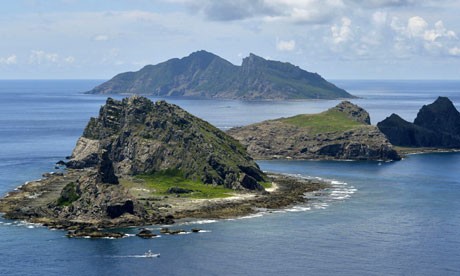World concerned about sea and island sovereignty in 2012

Senkaku/Diaoyu islands |
(VOVworld)- One of the world’s top concerns in 2012 was security at sea as tensions over sea and island sovereignty arose in the Asia Pacific region, making sovereignty a hot topic at international forums.
In August 2012, Japan and China confronted each other verbally and physically, each claiming sovereignty over an island group, called Senkaku by Japan and Diaoyu by China. Tensions began when Japan arrested a group of social workers from Hongkong, China who landed on the island. A few days later, 150 right wing activists from Japan came to the island, planted Japan’s national flag, and sang the Japanese national anthem. The tension increased when Tokyo decided to nationalize 3 of the disputed islands. Since then, both sides have continued to exchange sharp words and Chinese ships have patrolled near the island despite warnings from a Japanese patrol force. Tokyo accused Chinese aircraft of violating its airspace and in retaliation, sent out F-15 jets. All these moves have worsened relations between China and Japan. The two countries have decided to cancel all activities to celebrate the 40th anniversary of the normalization of bilateral ties and all high-level meetings.
The relationship between Japan and the Republic of Korea has also become strained. Japan strongly criticized South Korea after President Lee Myung Bak led a group of Korean officials to Dokdo island, which is controlled by South Korea, but which Japan also claims sovereignty over, calling it by the name Takeshima. Despite Japan’s opposition, 3 days later a group of Korean activists organized a swimming event from an eastern port of South Korea to Dokdo/Takeshima island. South Korea announced it would conduct a joint patrol involving naval, ground, and air forces to defend Dokdo island against foreign attacks. The two countries intend to bring the dispute to the International Court of Justice.
The East Sea’s trade, energy and strategic potential sparked other conflicts in the region last year. Security in the East Sea was high on the agenda of several seminars and forums including the UN Security Council, the Asia Europe Meeting and the East Asia summit. The increased tension in the region has provoked fears of a possible war as a result of a provocative act. Budget allocations for military purposes have increased sharply in many countries and demonstrations of military strength have occurred with increasing frequency. With natural resources dwindling, many countries have been forced to seek other energy resources at sea. But economic and trade cooperation is still the focus of Asia Pacific diplomacy.
Anh Huyen